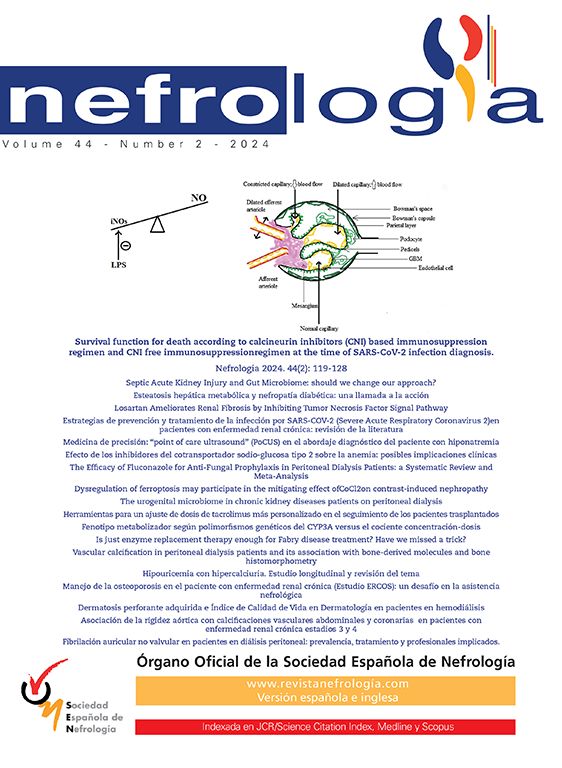Journal Information
Full text access
EVALUATION OF VIRAL LOAD AND ANTIGENEMIA AS MARKERS FOR RELAPSE CYTOMEGALOVIRUS INFECTION IN RENAL TRANSPLANT RECIPIENTS.
ESTUDIO DE CARGA VIRAL Y ANTIGENEMIA COMO VALORES PREDICTIVOS DE RECIDIVA DE INFECCIÓN CMV EN EL TRASPLANTE RENAL
Visits
5102
ANTONIO FRANCO ESTEVE, RICARDO SERRANO GARCIA, ADELINA GIMENO GASCON, JOAQUIN DE JUAN, ESPERANZA MERINO, LUIS JIMENEZ DEL CERRO, JOAQUIN
This item has received
Article information
Cytomegalovirus (CMV) is a pathogen, commonly found in the donors and recipients of solid organ transplantation. CMV is one of the major causes of morbidity and mortality in these patients. Relapsing episodes of CMV infection occur in 23-33% of transplant patients which is likely a reflection of incomplete suppression of viral replication following antiviral treatment with intravenous ganciclovir. We have studied CMV DNA load and antigenemia as markers for relapse of CMV infection in 49 renal transplant patients out of 68 with CMV infection who received a course of intravenous ganciclovir among 300 transplants carried out between January of 2001 and June of 2005. Viral load and antigenemia were measured in blood samples obtained before, during and at the completion of treatment. We also studied different viral load as predictors of relapse CMV infection. Twelve (24.5%) of 49 recipients developed relapsing CMV infection. The relapsing group had higher viral loads after treatment than the no relapsing group. There was no difference in antigenemia level between both groups. The viral loads before and during the treatment, the age and sex of donors and recipients, inmunosupresión, percentage of seronegative recipients with seropositive donors, duration of the therapy and the percentage of patients with heavy inmunosupression were similar in the two groups, but the incidence of acute rejection was higher in the relapsing group. We also evaluated the range of viral load after treatment which is able to trigger the relapse of CMV infection. We conclude that CMV DNA load after treatment is a useful marker for individualizing antiviral treatment of CMV infection in renal transplant recipients. Acute rejection is a risk factor to the relapsing CMV infection.
Keywords:
renal transplantation, CMV infection, viral load, relapse
El citomegalovirus (CMV) es un patógeno que se encuentra frecuentemente tanto en donantes como en receptores de trasplantes de órganos sólidos. La infección por CMV es una de las mayores causas de morbilidad y mortalidad en estos enfermos. Entre el 23% y 33% de los pacientes trasplantados presentan episodios de recidiva de infección por CMV, debido probablemente a una supresión incompleta de la replicación viral tras el tratamiento con ganciclovir intravenoso. Hemos evaluado la carga viral y la antigenemia como marcadores de recidiva de infección por CMV en 49 de los 68 receptores de trasplante renal que presentaron una infección por CMV y recibieron un curso de tratamiento con ganciclovir intravenoso de entre los 300 transplantes realizados en el periodo comprendido entre Enero de 2001 y Junio de 2005. Se analizó la carga viral y la antigenemia en estos pacientes antes del tratamiento durante y al final del mismo. Además hemos estudiado el valor predictivo en la aparición de recidiva de infección de diferentes cargas virales a la finalización del tratamiento. Doce (24.5%) de los 49 paciente desarrollaron recidiva de la infección CMV, presentando dicho grupo de pacientes una carga viral significativamente más alta después del tratamiento que el grupo de pacientes sin recidiva de la infección. No había diferencias entre el nivel de antigenemia entre ambos grupos en ninguno de los momentos estudiados, ni en la carga viral al inicio ni durante el tratamiento. No encontramos diferencias significativas entre la edad y el sexo del donante y del receptor, tipo de inmunosupresión basal, porcentaje de receptores seronegativos con donantes seropositivos, duración del tratamiento, porcentaje de pacientes que recibieron inmunosupresión de alto riesgo en los grupos estudiados, pero la incidencia de rechazo agudo fue significativamente superior en el grupo con recidiva. Hemos hallado diferentes puntos predictivos para el desarrollo de la recidiva. Concluimos que la carga viral al finalizar el tratamiento es un marcador útil para individualizar el tratamiento antiviral de la infección por CMV en los receptores del trasplante renal. La aparición de rechazo agudo es un factor de riesgo asociado a la recidiva de la infección.
Palabras clave:
trasplante renal, infección CMV, recidiva
Full text is only aviable in PDF





